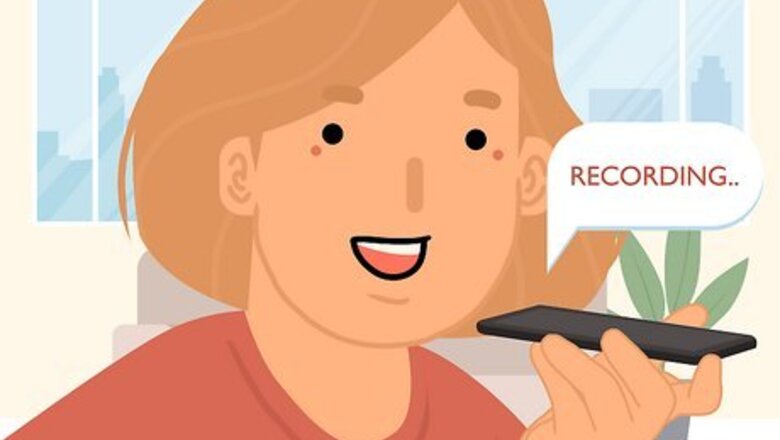
views
Changing Your Laugh

Use a sound recorder to study your laugh. Tape yourself laughing, or ask someone else do it for you. Then, play back the recording and listen for what makes your laugh unique or undesirable. Maybe you snort loudly and often; maybe you giggle more than you'd like. As you work to change your laugh, you can record and rerecord your laugh to analyze your progress and tweak the style. If you have a specific new laugh in mind, consider playing the recording of your original laugh at the same time as a recording of the laugh you'd like to imitate. This way, you may be able to better hear the subtle differences between the two.

Find a space where you can be alone. Try laughing in the car, or in a remote area, or in front of the mirror. When you feel ready, start laughing in the way that you want to laugh. Try to practice your laugh and actively tweak the way that you sound.

Make yourself laugh authentically. Think of something hilarious, or have a friend tell you a joke, or watch something funny. Try to make the laugh genuine so that it will more accurately represent the way that your laugh sounds in real life. If you can't bring yourself to laugh at anything else, just laugh at the absurdity of what you're doing: staring into a mirror and laughing at yourself self-consciously.

Try to get to the root of your undesirable laugh. If your laugh is too nasally, focus on the way that you flex your nose when you laugh. Instead, try to direct laughs through your diaphragm: an air channel which sits near your gut, just below your lungs. If your laugh is too loud, try to react a bit more quietly. Amy Cuddy Amy Cuddy, Social Psychologist Record your usual laugh, analyzing elements you wish to adjust like pitch, volume, or heartiness. Focus on your desired sound as you laugh freely alone. With daily repetition, consciously shape your laugh toward your preferred expression while maintaining authenticity.
Choosing Your Laugh

Pick a new laugh style. If you don't have a style in mind, make it a goal to actively search for a laugh that you like. Look for inspiration everywhere that people are laughing: listen to the people you meet, characters from movies, and television personalities. Listen to loved ones and listen to strangers. Constantly be on the lookout for good laughs. YouTube is a good source of recorded human speech – as is the Internet, period. Think about why you like certain laughs. Maybe you like a laugh because it's deep and hearty, or because hearing it makes you yourself laugh.

Imitate a laugh that you like. When you hear a laugh that inspires you, try to remember it or record it. When you're alone, find a mirror and try to mimic the laugh you heard. This mimicry may happen naturally, if you spend time around people with compelling laughs – but you can certainly make the process more intentional by choosing which laugh to try. Be aware that if you outright mimic a laugh that's famous from television or a movie, people may notice. Decide whether or not you want this.

Reflect on what you don't like about your current laugh. So, for example, say that you feel your laugh is too loud. In that case, you'll probably want to focus on adopting a quieter laughing style. Maybe you feel like your laugh is too silly; then, you might want to try out a more serious laugh. It goes without saying though that you're laugh is fine the way it is! If you want to change things up, you should definitely do that. But in the meantime, don't stress about whatever's making you insecure about your giggle.

Consider whether there is anything you really need to change. People are often unaware that their breathing needs change when laughing; for instance, many people snort because that is the way the body has adapted to get more oxygen during laughter. Try asking people who are close to you about how your laughter sounds. This can be very illuminating: if there is something annoying or disturbing about your laugh, they will likely tell you!
Practicing

Make an effort to use the new laugh in social situations. Be aware of how you sound when you laugh and speak. You may need to be almost hyper-aware, at first, in order to consciously laugh in the style you've chosen. Over time, however, you may find that the sound becomes more natural. If you catch yourself slipping back into the old laugh, don't get frustrated. Your old laugh was a habit that evolved naturally through years of jovial interactions with people, and it can be a very hard impulse to break. The important thing is that you're conscious of the way that you're laughing. If you're conscious of how you sound, it may be easier to actively shift that sound.

Practice the laugh every chance you get. Whenever you're alone, work on the new sound: make yourself laugh, and keep laughing until you're happy with how it sounds. You can do this in the car, in the park, or in front of a mirror. Be aware of the setting – other people may get uncomfortable if you practice your laugh around them when they haven't said anything funny.

Don't be afraid to let the laugh evolve. If you choose to strive for a specific style of laughter, it's important to keep in mind that practice can change intent. Just as your natural laugh was shaped by environmental influences—the people with whom you interacted, the movie characters you idolized, the laughs that you liked and subconsciously tried to imitate—so too will your new laugh be influenced by new experience. This doesn't mean that you won't like your laugh; it just means that you don't need to be too picky about the way you sound, as long as you like it.

Introduce your laugh slowly when around friends. Don't spring it on everyone – use it increasingly more often. Get used to your laugh first, and eventually you may not have to think about it at all. Your brain will gradually adapt and remember the tone.


















Comments
0 comment